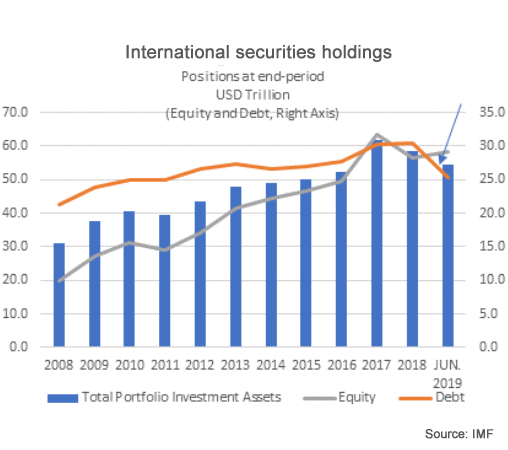A recent legal case in Singapore highlights the jurisdictional problems when issuing international loans and securities. Although the case did not involve tokens, as debt and security blockchain tokenization expand, so might the choices for the relevant country to pursue a dispute.
The case involved an Indonesian company issuing senior secured loan notes on the Singapore Stock Exchange (SGX) with New York as the contractual jurisdiction. The question arose whether the foreign company had the legal standing in Singapore to apply for moratorium protection, an authorization to postpone debt repayments. The High Court found that having the Notes listed on SGX was enough to establish a substantial connection, therefore authorizing the foreign company to apply for the moratorium.
If the loan notes were tokenized, the situation could be even more complex. That’s because tokens might have multiple listing venues and if the token isn’t native, there’s both the jurisdiction of the token and the underlying asset it represents.
Before delving into the legal case, we explore the context in terms of tokenization and Singapore’s position.
Internationalization, tokenization and Singapore
Between 2008 and 2017, holdings of foreign debt and equity securities doubled from $30 trillion to $60 trillion (Source: IMF), although international debt has since declined. The proportion of debt issued as securities compared to bank debt also increased significantly since the 2008 crisis.

One of the key benefits of tokenization is to increase the investor pool, including enabling international investors. Multiple organizations involved in tokenizing financial assets – including Santander and HQLAx (partnered with the Deutsche Börse) – have stated that the legal complexities in launching platforms and offerings outweigh the technological ones.
Meanwhile, Singapore is leveraging its position as the world’s fifth leading financial center to become a leading blockchain and token jurisdiction. It was one of the first to license a digital asset bank (Sygnum) and has been at the forefront of central bank digital currency research. Singapore’s Blockchain Ecosystem, created by Tribe Accelerator and supported by the Singaporean government, has expanded to more than 200 companies. It allows government agencies, corporates and blockchain companies to connect through a single online platform.
In a recent review of Singapore’s fintech sector by the IMF, it commended MAS for striking the right balance between innovation and safety and soundness. In terms of tokens, it noted that a hack or other incident “may create a reputational risk to MAS despite its specific regulatory focus”.
That report was published in 2019 and outside of tokens, this year has not been good for Singapore. German payments firm Wirecard imploded in June with $2.1 billion missing from its Asian balance sheet. Its Asian headquarters are in Singapore, although the company wasn’t licensed by MAS. Questions are being asked about the roles of auditor EY and German regulator BaFin in Wirecard’s demise. But for Singapore, despite a recent arrest, this is a dent to its reputation.
And it’s not the only failure this year. In April, one of Singapore’s biggest oil traders, Hin Leong Trading, collapsed owing banks $3.5 billion following alleged trade finance fraud. It was one of four commodity traders to fail this year.
Fortunately, these events haven’t knocked Singapore off its pedestal. So with that context, let’s explore the legal case.
A question of jurisdiction
In 2018, investment company PT MNC Investama TBK (PT), which is listed on the Indonesian Stock Exchange, issued $231 million worth of 9% Senior Secured Notes. These Notes are listed on the Singapore Stock Exchange (SGX). In light of the COVID-19 pandemic, PT and its subsidiaries are in financial difficulty, leading to the Notes being a payment burden. For PT to negotiate with Noteholders and propose an arrangement scheme, it is seeking moratorium protection under S.211B* of the Singapore Companies Act.
To have the legal standing to make the moratorium application, foreign companies must satisfy the ‘substantial connection test’ with Singapore. Factors that a court may take into account in determining ‘substantial connection’ are found in S.351(2A)* of the Act. These include situations where Singapore must be the center of the company’s main interests, among other things.
What is curious about this case is that PT could invoke none of the factors mentioned in S.351(2A), yet the court decided that the list was neither definite nor exhaustive. The court recognized that the PT’s business activities, administration and control were primarily situated in Indonesia, and that its loan notes were governed by New York law. It also points out the lack of submission to, or invocation of Singapore law in any dispute. Despite this, it found that having notes listed on the SGX was enough to establish non-transient, substantial business activity. Additionally, the listing of securities that are subject to Singaporean regulations was found to be another factor indicating a substantial connection.
Further questions
If the securities contract had specified jurisdiction as New York for protection from creditors or bankruptcy, would that have made a difference? Will Note-holders challenge the Singaporean decision?
Considering the question from a private international law or conflict of laws perspective, one could simply look to the lex situs rule. Lex situs can be defined as ‘the law of the place where property is situated’. It’s a rule used by many countries to determine the ‘proprietary effects of a transfer of property, including a transfer of property by the way of security.’ (Cranston et al (2017) p. 555).
This rule in itself contains conflicting approaches. The lex situs of securities may be: 1) ‘the place of incorporation of the issuer;’ or 2) where the securities are situated; or 3) concerning registered securities, where the register is situated, and the list continues. Some jurisdictions find the applicable law to be the ‘law of the place of the relevant depository/settlement system maintaining the securities account’ (Ibid, p. 556). The EU Financial Collateral Directive also holds this conflict of laws solution to be true (Article 9.)
According to a partner at law firm Oon & Bazul, Keith Han, for debt restructuring the Singapore Court can assume jurisdiction, regardless of what is agreed upon between the parties of the contract. One of the reasons is that a company undergoing restructuring will have multiple creditors, all of which may have contracts with different jurisdictional clauses. While a creditor’s contract may provide for disputes to be resolved in another jurisdiction, this does not oust the Singapore Court’s jurisdiction so long as there is sufficient connection, which appears to be based on the Singapore’s Court discretion.
The next question was what is the Note-holder’s position? “If noteholders had contested the jurisdiction of the Singaporean Court, they would have had to argue that there was no substantial connection between the company and Singapore,” said Han via email. “Since substantial connection to Singapore is the question, the submission to foreign courts and election of foreign laws are irrelevant. Similarly, it does not matter whether foreign courts were concerned with protection of foreign creditors or not.”
Han continued: “However, these factors might come into play in the recognition of the Singapore proceedings and/or eventual scheme or compromise in foreign jurisdictions. The ability to recognise and enforce the Singapore Court proceedings and sanctioned scheme will depend on the laws of the enforcing jurisdiction, and among other things, whether the terms of the scheme sought to be enforced is against the public policy of that jurisdiction. For instance, in the UK, the ‘Gibbs Rule’ may still prevent the English Courts from recognising and enforcing a foreign scheme that compromises an English-law governed debt.”
One takeaway from this analysis is that being an international securities lawyer is likely to become an increasingly lucrative role.
* Please note: Section 211B and Section 351(2A) of the Companies Act are now found under Section 65(1) and Section 246(3) of the Insolvency, Restructuring and Dissolution Act 2018 respectively.







